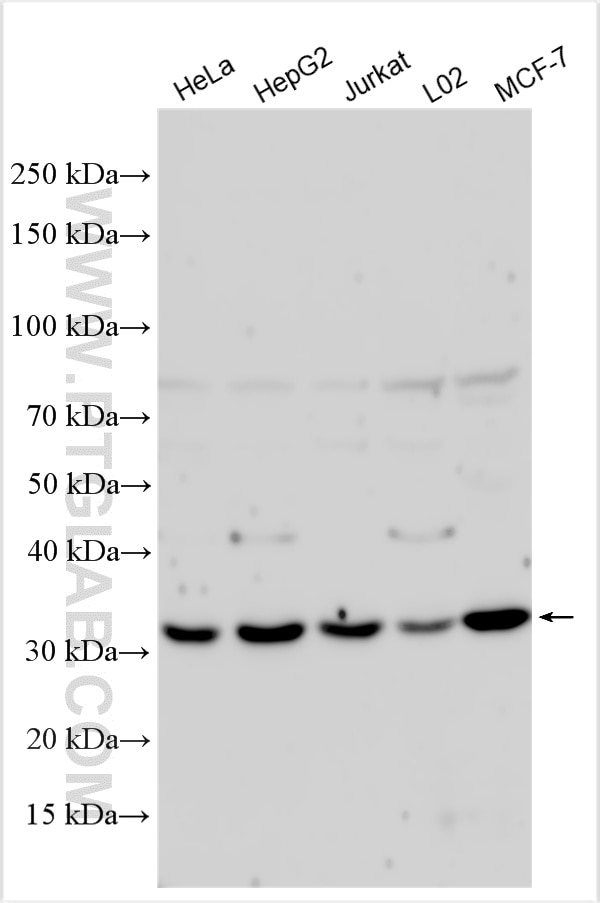PNAD Polyklonaler Antikörper
PNAD Polyklonal Antikörper für WB, ELISA
Wirt / Isotyp
Kaninchen / IgG
Getestete Reaktivität
human
Anwendung
WB, ELISA
Konjugation
Unkonjugiert
Kat-Nr. : 17132-1-AP
Synonyme
Geprüfte Anwendungen
| Erfolgreiche Detektion in WB | HeLa-Zellen, HepG2-Zellen, Jurkat-Zellen, L02-Zellen, MCF-7-Zellen |
Empfohlene Verdünnung
| Anwendung | Verdünnung |
|---|---|
| Western Blot (WB) | WB : 1:500-1:3000 |
| It is recommended that this reagent should be titrated in each testing system to obtain optimal results. | |
| Sample-dependent, check data in validation data gallery | |
Produktinformation
17132-1-AP bindet in WB, ELISA PNAD und zeigt Reaktivität mit human
| Getestete Reaktivität | human |
| Wirt / Isotyp | Kaninchen / IgG |
| Klonalität | Polyklonal |
| Typ | Antikörper |
| Immunogen | PNAD fusion protein Ag10880 |
| Vollständiger Name | N-terminal asparagine amidase |
| Berechnetes Molekulargewicht | 310 aa, 35 kDa |
| Beobachtetes Molekulargewicht | 30-35 kDa |
| GenBank-Zugangsnummer | BC017336 |
| Gene symbol | NTAN1 |
| Gene ID (NCBI) | 123803 |
| Konjugation | Unkonjugiert |
| Form | Liquid |
| Reinigungsmethode | Antigen-Affinitätsreinigung |
| Lagerungspuffer | PBS with 0.02% sodium azide and 50% glycerol |
| Lagerungsbedingungen | Bei -20°C lagern. Nach dem Versand ein Jahr lang stabil Aliquotieren ist bei -20oC Lagerung nicht notwendig. 20ul Größen enthalten 0,1% BSA. |
Hintergrundinformationen
PNAD is an N-terminal aspartic acid deamidation enzyme, which can deamidate N-terminal aspartic acid residues to aspartic acid, making the protein prone to arginination, polyubiquitination and degradation. In addition, PNAD is involved in the regulation of apoptosis by mediating the degradation of the C-terminal fragment of Drosophila apoptosis suppressor protein 1.
Protokolle
| PRODUKTSPEZIFISCHE PROTOKOLLE | |
|---|---|
| WB protocol for PNAD antibody 17132-1-AP | Protokoll herunterladen |
| STANDARD-PROTOKOLLE | |
|---|---|
| Klicken Sie hier, um unsere Standardprotokolle anzuzeigen |


